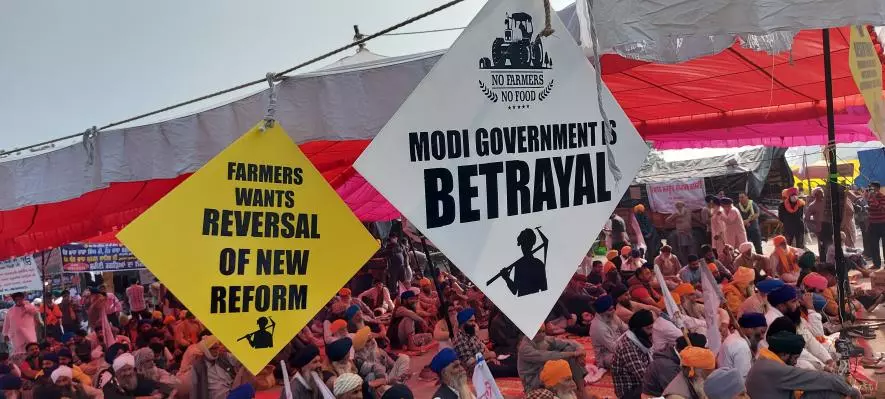To Avert Covid Risk, Centre Must Talk to Farmers, Repeal Farm Laws

File photo.
The agitation staged by farmers on the borders of Delhi and across the country completes six months on 26 May. The protesting farmers are demanding a rollback of the three draconian anti-farmer laws passed by the Centre last year. On Friday, the Samyukta Kisan Morcha (SKM), the umbrella body of various farmer organisations, wrote to Prime Minister Narendra Modi seeking to resume talks with them. To mark six months of their militant united protest, farmer leaders have called on the farming community and other citizens to observe 26 May as a Black Day by hoisting black flags on their homes, tractors and vehicles and burning Modi effigies in villages. The SKM has also warned the government the protests will intensify after 26 May if there is no positive response from the Union government.
The last round of talks between the farmer representatives and central government ministers was held on 22 January. There were 11 rounds of talks between the two sides until they were suspended by the government, citing the violent incidents on Republic day. The widespread assumption was that the violence was preplanned and perpetrated by associates of the Sangh Parivar to malign the agitation as it was garnering support across the nation from workers and other sections.
Given the growing number of positive cases of Covid-19 during the second wave of the Coronavirus pandemic, the SKM has said in a letter to the Prime Minister that it does not want to put the protesting farmers at risk of infection. Nor does it intend to distract the government during this epidemic. It also noted that as many as 470 agitating farmers sacrificed their lives during this agitation. Now that the Rabi crop harvest is over, thousands of farmers from Haryana and Punjab are returning to protest at Singhu, Tikri, and other protest sites. Therefore, the responsibility to end the agitation and discontent lies with the Union government. The SKM has also demanded the immediate repeal of the three pro-corporate and anti-farmer farm laws. Further, it has demanded a legal guarantee for Minimum Support Prices for all crops, based on the C2 + 50% cost recommended by the Swaminathan Commission (C2 includes the imputed costs of family labour, rent of self-owned land and interest on owned capital.) It also demanded protection from the proposed pro-corporate electricity price hikes.
Without a guaranteed MSP, farmers are only losing, and this is evident from the large number of agriculturists who commit suicide every year. Further, the Commission for Agricultural Costs and Prices (CACP) announces the MSP for 23 crops, but the government only procures two crops—rice and wheat. Economists have estimated that due to disparities in the market and non-payment of MSPs, farmers lost a large sum of approximately Rs. 45 lakh crore. These are conservative estimates, and the losses would run into multiples of this. Data from the Rabi Price Policy Reports of the CACP demonstrate the gains that are possible by including C2+50% to the MSP (top dark line in the graph below).
During talks with farmers, the government only gives verbal assurances that it will pay the MSP as demanded. It is not willing to legalise this promise as an assured payment in markets. This is unacceptable, as more than 90% of farmers do not get MSP and are forced to sell their produce to local traders at a one-third price. Only 6% of farmers avail MSP today. Can the government legally guarantee an MSP to the remaining 94% of farmers, as the Maximum Retail Price assured for industrial goods?
The government insists the new farm laws will raise farmers’ profits as agribusiness corporations will add value to their produce. It cites the example of new Basmati Rice varieties developed by breeders and genome scientists in the publicly-funded agricultural research organisation ICAR (Indian Council of Agricultural Research).
In 2020, traders and agribusiness giants exported new Basmati Rice varieties worth approximately US$ 3 billion. The market price for these varieties ranges from Rs 200 to 400 per kg in the domestic and international markets. However, the traders and corporations pay the farmers merely Rs 18 to 20 per kilogram for this rice.
Ironically, the laboratory I worked for contributed to developing the new disease-free Basmati rice varieties with other breeders at the IARI but did not benefit by a single rupee from the massive revenues earned annually from it. Nor did the surplus enrich rice farmers. All this is just the tip of an iceberg. The new farm laws are bent on readjusting markets to impoverish farmers further and raise the profits of big corporations. Though the government professes faith in the farm laws, the surplus earned from value-addition at the privatised mandis did not benefit either the farmers or the public research organisations.
The ongoing struggle of farmers against three farm laws demonstrates the might of a united battle against the privatisation of agricultural production, markets and food distribution. Their struggle successfully demonstrated how the new laws will destroy the PDS and other essential services. And it is garnering support from workers and the general public. In 2014, a united farmers’ struggle forced the government to roll back the pro-corporate land acquisition bill. Similarly, an organised and united farmers struggle would make the present government roll back the three farm laws.
As thousands of farmers are returning to protest sites along the Delhi border, there is a serious threat of Covid-19 infections. Hence, the Union government should immediately speak to farmers representatives and repeal all three farm laws unconditionally.
Dr Soma Marla is a retired principal scientist, genomics, ICAR New Delhi. The views are personal.
Get the latest reports & analysis with people's perspective on Protests, movements & deep analytical videos, discussions of the current affairs in your Telegram app. Subscribe to NewsClick's Telegram channel & get Real-Time updates on stories, as they get published on our website.























